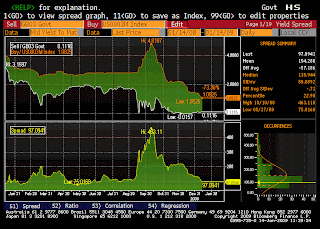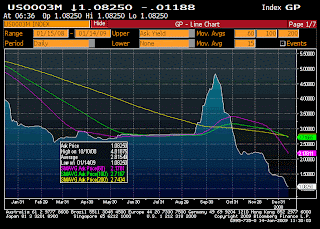So it's not just Citi who's getting a ton of cash even though they svck, Bank of America is pretty much the same. Bloomberg has this:
" Jan. 16 (Bloomberg) -- Bank of America Corp., the largest
U.S. bank by assets, posted its first loss since 1991 and cut
the dividend to a penny after receiving emergency government
funds to support the acquisition of Merrill Lynch & Co.
The fourth-quarter loss of $1.79 billion [...]exclude $15.3 billion
in losses at Merrill, which was acquired earlier this month.
The losses, coupled with the U.S. lifeline of $138 billion,
put more pressure on Chief Executive Officer Kenneth D. Lewis to
make the takeovers of Merrill and mortgage lender Countrywide
Financial Corp. pay off."
I dunno, but getting government help b/c you're too strapped for cash b/c you bought two faltering institutions... that seems kinda wrong! That's like if I buy myself three Ferraris and then ask my parents to pay for my rent b/c I can't afford it anymore and when they ask me why I bought the Ferraris in the first place I say: "I
had to. They were such a steal, it would've been stupid
not to buy them.
AND: BoA makes a loss... but that doesn't include $15.3 billion, repeat fifteen point three BILLION dollars, in losses from Merrill. Wow, that Merrill Lynch was a real steal for them!
But so what exactly is this kind of lifeline? The gov't just injected $20 billion, which apparently will take BoA/Merrill only about a quarter to burn through and then they get $138 billion as a "lifeline"? What
is as lifeline? Is it like a loan? Yeah, as if that's gonna pay back! So then here's why all of that happened.
"Bank of America officials then told regulators last monththat the Merrill deal might be abandoned because of worse-than-expected results, Lewis said. The government insisted thetransaction proceed because its collapse would create newturmoil in the financial system, he said."
That makes real sense! "Nonono, you
have to go ahead with this b/c otherwise it'll be the end of the world. Don't worry, we'll help you now. We're sure you won't run into a wall a few months down the road and need to split everything back up again. That never happens. Look at Citibank, that didn't happen to them! Errrr.... wait a second...."
And then... and
then:
“'We just thought it was in the best interest of our company
and our stockholders and the country to move forward with theoriginal terms and timing' for buying New York-based Merrill,Lewis said today."
The country??!!! Don't act as if you care about the country all of a sudden. If you subscribe to a relatively pure capitalist system (, which as a bank you surely), it's all find to say that you're just looking out for your shareholders. But don't pretend all of a sudden you're doing stuff b/c it's good for the country! If you wanna do something that's good for the country, axe the bonuses, institute government-employee payscales (b/c pretty soon you'll
be government employees) and let some people keep their job instead of axing them all -- that's something that's not good for your shareholders or you but it's good for the country.








